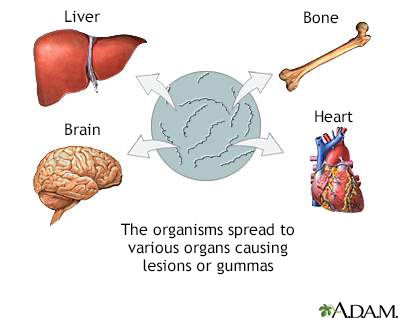Syphilis

What is Syphilis?
Syphilis is a sexually transmitted infection (STI) caused by the bacterium Treponema pallidum. It progresses in stages and can affect various organs and systems in the body.
Who's at Risk for Syphilis?
Anyone engaging in sexual activity, particularly unprotected sex, with an infected individual is at risk for syphilis. Certain factors, such as having multiple sexual partners, engaging in high-risk sexual behaviors, or having a history of STIs, can increase the risk.
What Causes Syphilis?
Syphilis is caused by the transmission of the bacterium Treponema pallidum through direct contact with syphilis sores during sexual activity. It can also be transmitted from an infected mother to her unborn child during pregnancy (congenital syphilis) or through blood transfusion (rare).
How does Syphilis Start?
Syphilis starts when the bacterium Treponema pallidum enters the body through breaks in the skin or mucous membranes during sexual contact with an infected person. The infection progresses through various stages if left untreated.
What are the Symptoms of Syphilis?
Syphilis symptoms vary depending on the stage of the infection. In the primary stage, a painless sore called a chancre appears at the site of infection. In the secondary stage, a rash, fever, swollen lymph nodes, and flu-like symptoms may develop. In the latent stage, there are no apparent symptoms. If the infection progresses to the tertiary stage, it can affect various organs, including the heart, brain, and bones, leading to severe complications.
How is Syphilis Diagnosed?
Syphilis is diagnosed through a combination of medical history, physical examination, and laboratory tests. Blood tests are commonly used to detect antibodies or specific antigens related to the infection.
How can Syphilis be Treated?
Syphilis is treated with antibiotics, typically penicillin, which is highly effective at curing the infection in its early stages. The choice of antibiotics and duration of treatment depend on the stage and severity of the infection.
What Complications may Occur with Syphilis?
If left untreated, syphilis can lead to severe complications. These can include damage to the heart, blood vessels, brain, spinal cord, and other organs, as well as an increased risk of acquiring or transmitting HIV. Congenital syphilis can cause stillbirth, premature birth, or long-term health issues in newborns.
How can I Prevent Syphilis?
Preventing syphilis involves practicing safe sex, including consistent and correct use of condoms, reducing the number of sexual partners, and getting tested regularly for STIs. Pregnant women should receive prenatal care to prevent transmission to their babies.
Long-term Management of Syphilis
Long-term management of syphilis primarily involves ensuring that the infection is adequately treated and monitoring for potential complications. Regular follow-up appointments and partner notification are crucial to prevent reinfection and further transmission.
What is Recent Research Saying About Syphilis?
Recent research on syphilis focuses on improving diagnostic tests, identifying drug-resistant strains, exploring novel treatment strategies, and implementing effective public health measures to control the spread of the infection.
Where can I go for More Information on Syphilis?
For more information on syphilis, you can visit reputable sources such as the Centers for Disease Control and Prevention (CDC), and the World Health Organization (WHO), or consult with healthcare providers specializing in sexual health and STIs.

